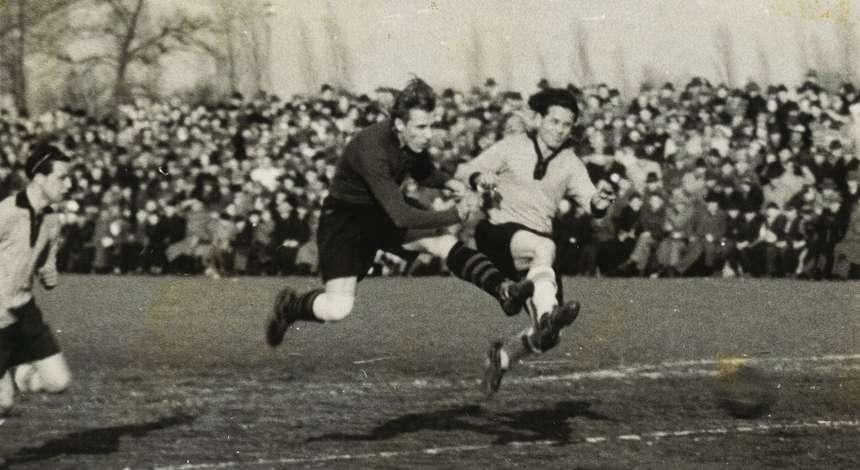
Situation report
Two years before promotion, the club set course to play professional football when a large majority of the 400 members voted for the introduction of professional player contracts at the ‘Burghof’ on 18 July 1949. That paved the way for professional football in Leverkusen. From the 1949/50 season, the football section of the Sportvereinigung Bayer 04 Leverkusen included professional and amateur players. And, in a special edition of the club communication, they stated the ambitious target of “turning Leverkusen into a major power in football.”
That also required the right coach. Karl Winkler, whose contract was not renewed in 1949, was followed by the interim player-coach Theo Kirchberg who, in turn, was replaced by Lory Polster in January 1950. Polster ended the campaign in the Second League West in a rather disappointing fifth place. For the 1950/51 season, Raymond Schwab was the fourth coach at the helm under the Bayer Cross in less than two years. The 44-year-old took Oberliga side Rot-Weiss Essen to the finals for the German championship title in 1949 after previously having been a sports teacher, artist and boxer. Schwab set great value on the physical strength of his team, which was formed of a core of 13 contracted players for the 1950/51 season. That meant the aversion of injuries for the new season through intensive stamina training in the three-week pre-season. The dress rehearsal for the start of the season was a complete failure. At SpVgg Röhlinghausen, a second division club from Herne, the Bayer team lost 6-3 – probably because their legs were tired from the tough training sessions.
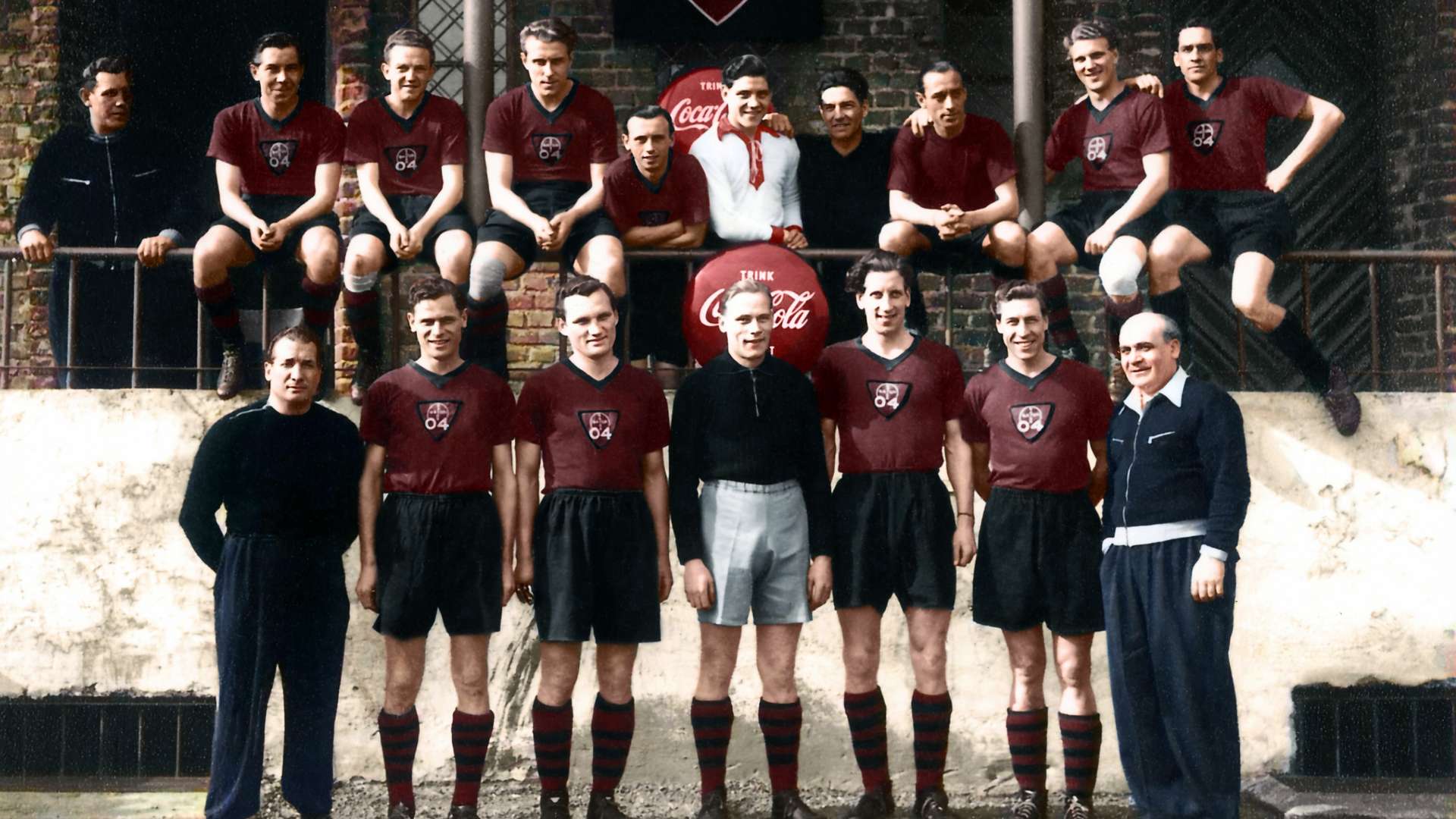
Alfred Strewinski, the deputy football director, set out the line for the first game of the new season away to SG Düren 99 on 27 August 1950: “With the proviso of good comradeship and hard work, we set out to have one up on our opponents through good fitness from the start.” The team took those words to heart and developed into a tight group that was not only shaped by team spirit but also ability on the pitch. Many of them worked full-time at the Bayer Works.
The team
Helmut Rennen: The goalkeeper, born in Leverkusen, had been a handball keeper for many years. He first went in goal on a football pitch in 1948. His reactions on the line were incredible. The then 29-year-old did not take any risks in the penalty area. “He won over the crowd with his daredevil exploits,” was the assessment of the Rheinecho.
Heinz Müller: When Rennen had a brief dip in form as the number-one goalkeeper, the reserve keeper stepped in for him. Müller made eight appearances in the Bayer goal and he proved to be a reliable stand-in.
Hans Frömmel: The captain and oldest player in the team at 31. The Leverkusen stalwart played for the Black and Reds from the age of ten and he progressed through all the youth teams. The right half impressed both in defence and in attack. Frömmel, who worked in the finance department at Bayer, was the calming influence in the team. A tireless, team player and fair opponent, who never picked up a single yellow card in his long career. He scored a brilliant goal from 25 metres out in the important 3-2 win at Bergisch Gladbach.
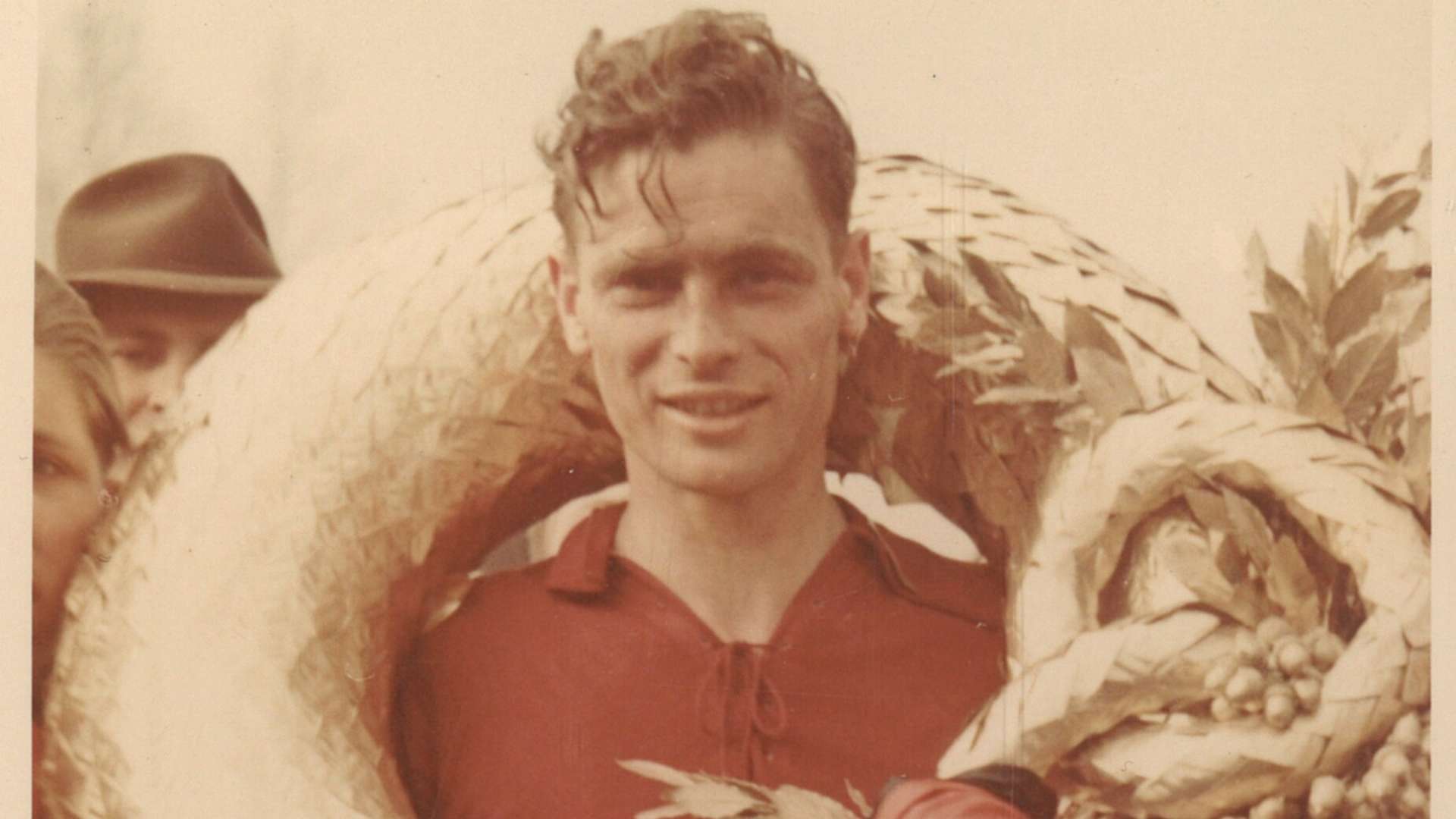
Jakob Kaiser: The youngest player in the team at the age of 23. The qualified lathe operator started his playing career at the Leverkusen club TuS Manfort, originally as a halfback in midfield but then he was moved to right-back. ‘Köbes’, as his teammates called him, was small and slight but he threw himself into every tackle and challenge and often acted as a man-marker. “His ability to be the last man who could frustrate apparently certain goalscoring opportunities for the opposition even astounded experts,” wrote the Kölnische Rundschau.
Peter Röger: Also born in Leverkusen, he briefly played for Jahn Küppersteg before moving on to Bayer at the age of fifteen. He was the tallest player in the team, strong in the air and with a powerful shot. The left-back made his debut for the first team as an 18-year-old in 1940. A role model as a battler and often dominant in the air. Röger stayed at the club after his playing career and became head of the football department in 1960.
Heinz Papenhoff: The central defender, who learned to play football in Bochum, moved with his family to Leichlingen after the war and he played for the Black and Reds from 1949. Papenhoff was seen as the “master of the penalty area,” was quick off the mark and he liked to get involved up front as a former winger and striker. He set up a number of goals with accurate crosses from set-pieces. The then 27-year-old finance worker liked to go to the theatre in his time off.
Richard Job: ‘King Richard’, a Leverkusen legend, had just returned from a one-year sojourn in his hometown of Vohwinkel and, along with Theo Kirchberg and Hans Frömmel, was one of the leaders on the pitch. The great technician played as a left wing back and the maestro in midfield. In the promotion season he provided assists and scored numerous important goals. Many observers praised his "incredible" calm, which he radiated.
Theo Kirchberg: The right-winger, the most prolific scorer for Leverkusen in the promotion season with 14 goals, was the Werkself player coach for several months in 1949. He gained his coach's licence under Sepp Herberger. At the age of 31, Kirchberg, who played for VfL Benrath for a long time before joining Leverkusen, was still one of the fastest players in the league. His "lightning runs down the touchline" (Rheinecho) and the ensuing crosses were feared exactly as much as his shots on goal. Kirchberg also coached the U19 and U17 teams at SV Bayer 04 Leverkusen at the same time. His immense experience as a player and coach made a significant contribution to the promotion success.
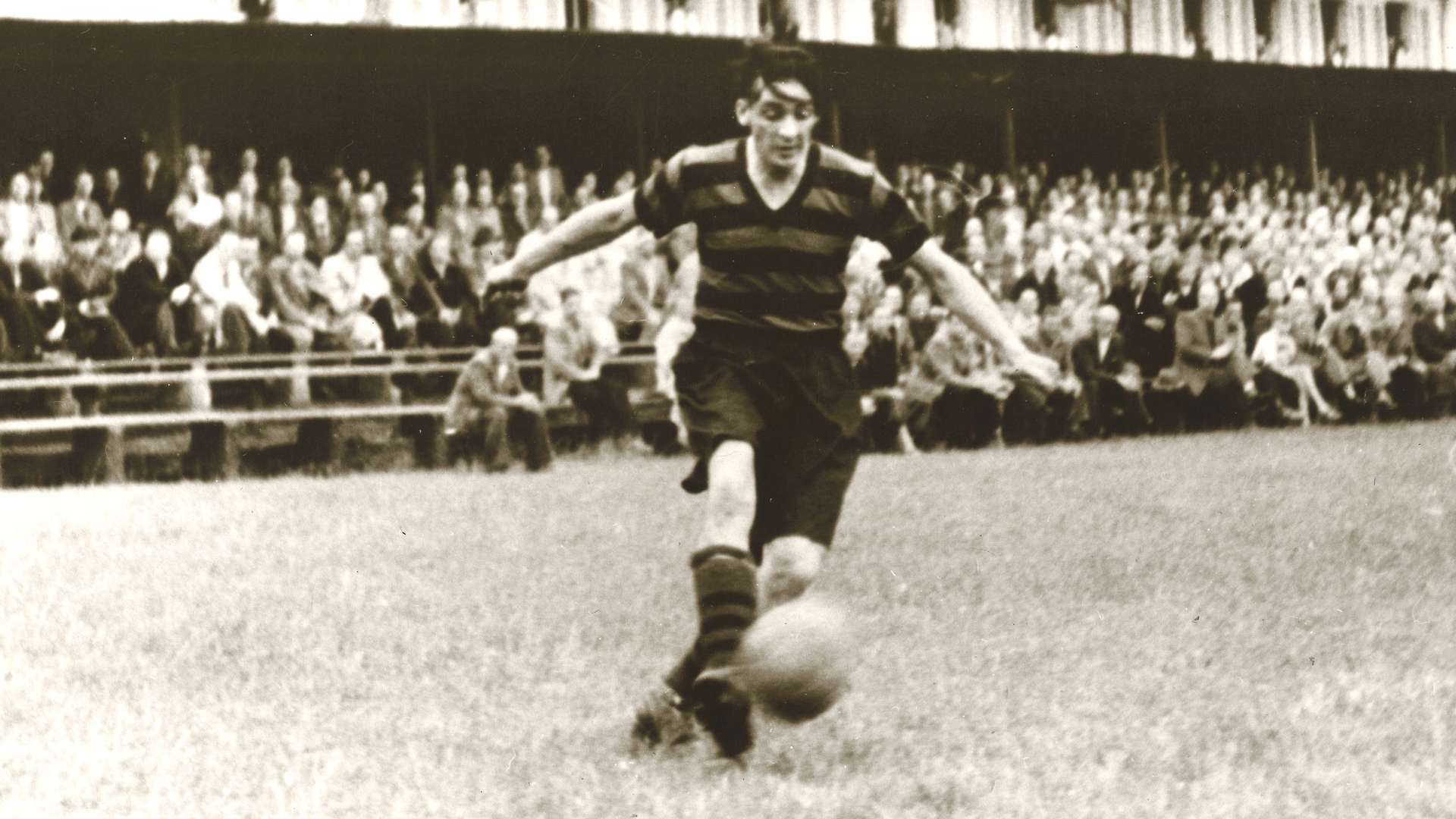
Hans Flohr: The striker and new signing from Idar-Oberstein scored a hat-trick on his debut for Leverkusen in a friendly against TSG Vohwinkel in 1950. And the "blonde Hans", his nickname, was able to fulfil expectations during the season. The 24-year-old scored seven goals and never eased off and sometimes even went into a game with a knock if that had to be.
Emil ‘Bubi’ Becks: The top goalscorer in the Oberliga West signed for Leverkusen from Rot-Weiß Oberhausen in 1949. The prospect of a white-collar job in the works played a big part in the striker's decision to move from the first to the second league. "Being able to work for Bayer was something special," he once said. It only took two years before Becks was also successful on the pitch with Bayer and he played an appreciable part in promotion to the top-flight. He scored seven goals in the 1950/51 season. "His powerful game as a striker can drive every opponent the desperation," wrote the Kölnische Rundschau. ‘Bubi’ Becks remained one of the most outstanding strikers in the Oberliga for the following five seasons.
Paul Wiorek: The man with probably the most astonishing career. 'Paule' – many newspapers gave him the nickname 'Atom Paule' due to his powerful shots – had been a professional soldier and actually opted for athletics and handball. He only started playing football in 1946 at the age of 21. The man from Duisburg was able to fully demonstrate his outstanding qualities as a sprinter as a left-winger. Along with Richard Job, Wiorek was the second highest goalscorer in the promotion team with 12 goals behind Kirchberg on 14.
Karl-Heinz Spikofski: The dribbler in the Leverkusen attack. 'Spiko' was brought to SV Bayer 04 from TuS Helene Essen by the new coach Raymond Schwab. The Rheinecho observed how he used his pace and sidestep "while laughing as he was able to get one over on his opponent." Alongside his technical elegance he stood out with his untiring commitment. Spikofski was a prisoner of war and forced labourer in France for many years after the war. In 1952, he was the first Bayer 04 player to move abroad to AC Turin, was even briefly at Barcelona, and was finally loaned out from Turin to the French club CO Roubaix-Tourcoing and later he played in Sicily for several years at Catania Calcio.
Reinold Pütz: The cheerful soul from Cologne-Mülheim made 17 appearances at left-back in the promotion season. Pütz, with his songs in Cologne dialect "always ensured a good mood and humour after a successful battle" (Rheinecho).
The season
The Schwab team made a successful start to the season on 27 August 1950 with a narrow but never endangered 1-0 win at Düren 99. 8,000 spectators came to the Stadion am Stadtpark a week later for the first home game against SC Rapid Köln. They saw a close fought match with Rapid, a bogey team for Leverkusen, leading 2-0 at half-time. 'Bubi' Becks pulled a goal back just after the restart but the Black and Reds had to settle for a 2-1 defeat in the end.
Black and Reds top at Christmas
The team also lacked consistency in the following games. Bayer did remain in the leading group but often found it hard going at home at the Stadtpark. In contrast, they were highly focused and effective away from home. Bayer 04 were away to the toughest promotion rivals SSV Wuppertal on 22 October 1950. The top match lived up to his billing. "Wuppertal has not seen such a good game for a long time," was reported in the Westdeutsche Rundschau, And they the the game had "Oberliga format". Theo Kirchberg netted the only goal of the game on 72 minutes to ensure a 1-0 victory for Leverkusen in an evenly balanced encounter. The goal, "scored from an impossible angle, was as beautiful as it was lucky," was reported in the Wuppertaler Zeitung and the paper added: "A better team than Bayer had not been seen at the Stadium this season." For SSV, who was also the first home defeat after more than two and a half years. Kirchberg, Job and Co. were happy to take all three points back to Leverkusen.
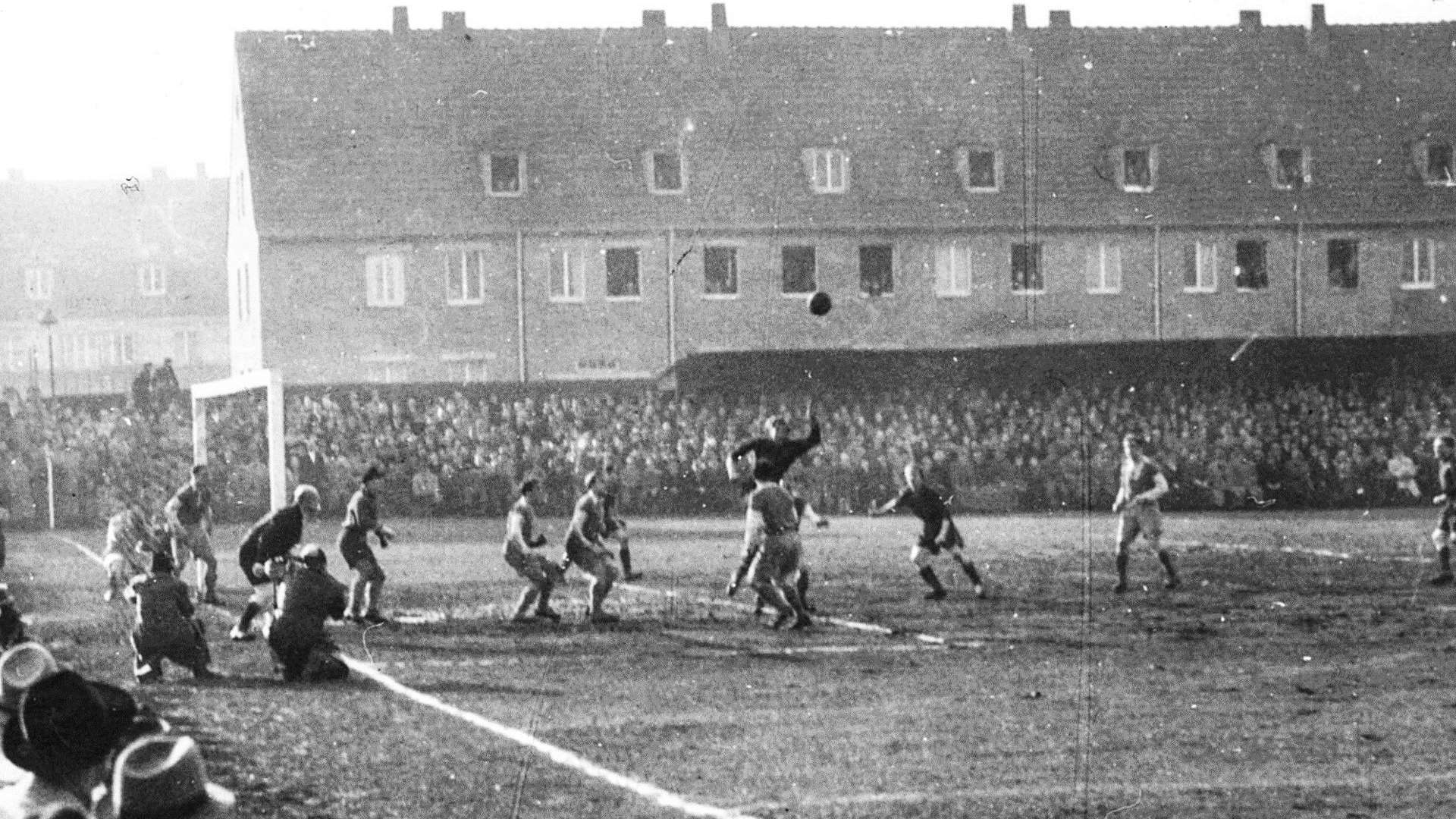
The team under coach Raymond Schwab went top of the table on matchday 10 after a 2-0 home win against TuRu Düsseldorf, and on matchday 15 a 5-3 win against VfL Benrath ensure they were top of the table at the halfway mark and at the end of the year they had a two-point lead over Bergisch Gladbach and Rapid Köln.
The first game in the second half of the season on 7 January 1951 saw the league leaders slip to a 3-2 defeat against next bottom SC Düren 99. In spite of twice taking the lead through Spikofski and Wiorek, Düren turned the game round before half-time. Immediately after the restart, Wiorek missed a penalty and a lot of other chances went begging. Bayer 04 lost the game but remained top of the table because the pursuing teams also slipped up.
The fans mobilise
The unexpected setback proved to be a wake-up call at the right time and clearly sharpen the senses of the team ahead of the coming tough games. And the Bayer fans certainly got behind their team with several thousand supporting the side for the next away game. "With huge black and red flags, trumpets and other instruments, Leverkusen's away support accompanied the league leaders to Mülheim. The whole of Leverkusen was united: 'We have to win',"declared the Kölnische Rundschau in their report on the 2-1 win for Bayer team at third-placed FC Rapid Köln. Spikofski and Flohr scored the goals for the Black and Reds and thereby ensured “sheer excitement amongst the numerous Bayer support" (Rheinische Post) amongst the almost 10,000 supporters. And the following match in front of 4,000 fans at the Stadtpark against TSG Vohwinkel ended in a 2-1 victory for Leverkusen with goals from Hans Frömmel and ‘Bubi’ Becks.
Exciting encounter in the cauldron
28 January brought the next and possibly crucial clash with a direct rival for promotion to the Oberliga. The league leaders from Leverkusen were away to neighbours and second in the table SV Bergisch Gladbach 09. "Would they come through the test of nerves? Did they have the means to be able to successfully counter the atmosphere at Kradepohl?," Was question posed by the Rheinische Post ahead of the top match. In front of 8,000 spectators at the 'Kradepohl cauldron', the glad back stadium, the visitors did hold onto the nerves. Top marks in defence went to Heinz Papenhoff and goalkeeper Helmut Rennen, captain Hans Frömmel put his team ahead with a wonder goal from 25 metres out. Gladbach levelled shortly after that. Richard Job restore the lead from the penalty spot the start of the second half but the hosts again hit back straightaway to make it 2-2. In a tough encounter, Paule Wiorek made it 3-2 for Bayer 04 – the lead over Bergisch Gladbach was extended to four points after matchday 19.
The Black and Reds remained solid in the following weeks. A 1-0 victory against Rhenania Würselen was followed by two draws at SC West (0-0) and against VfB Marathon Remscheid (1-1), with goalkeeper Fredy Mutz, who went on to join Leverkusen in the following season, excelling himself. After the 5-1 win at Preußen Krefeld, Bayer 04 now had a very comfortable lead over pursuers Bergisch Gladbach, VfL Benrath and SSV Wuppertal of seven and nine points respectively albeit Wuppertal had played two games less.
Showdown on big stage
Now, on 4 March, he came to the big showdown with SSV. If the game was won then promotion to the Oberliga was as good as done. The 11,000 crowd represented a record for the season. They witnessed a physical encounter with the Wiorek and Flohr giving the hosts a 2-0 lead at half-time. Wuppertal made it exciting when they pulled a goal back on 75 minutes. However, the Black and Reds held onto the lead with great commitment. "Bayer Leverkusen move up to the top-flight," was the rather premature headline in the Rheinische Post as the league title was not yet mathematically done and dusted. Nevertheless, Bayer 04 had kept the last serious rival at arm's length – only a complete collapse in form in the remaining six games would have been enough to stop Leverkusen.
They did not give anything away. On matchday 27, Bayer 04 and a 1-1 draw at VfL Benrath with Theo Kirchberg scoring the equaliser against his hometown club. That meant the Black and Reds only needed one point to win the Second League West and gain promotion to the Oberliga.
Five goal seals promotion
And nobody could seriously have doubted that one point could not be picked up against bottom of the table Fortuna Köln a week later on 8 April 1951. On that Sunday, 6,000 spectators in the Stadtpark witnessed promotion to Germany's top flight for the first time in the club's history. During the game, fans in the stand held up a banner: "Bayer 04 Leverkusen in the Oberliga!" On the pitch, Karl-Heinz Spikofski and Paul Wiorek, with a brace, swiftly established a 3-0 lead. The team from Cologne did pull a goal back before the break to make it 3-1. After the restart, Wiorek netted his third goal and 'Bubi' Becks put Leverkusen out of sight. Fortuna did score a second goal just before the end of the game.
There was no holding back after the final whistle. Spectators and players embraced each other on the pitch. Dr. Fritz Jacobi, the club chairman, put golden laurels round the neck of team captain Hans Frömmel, Leverkusen’s mayor Johannes Ritter presented a big bouquet and declared the city proud of its football players.
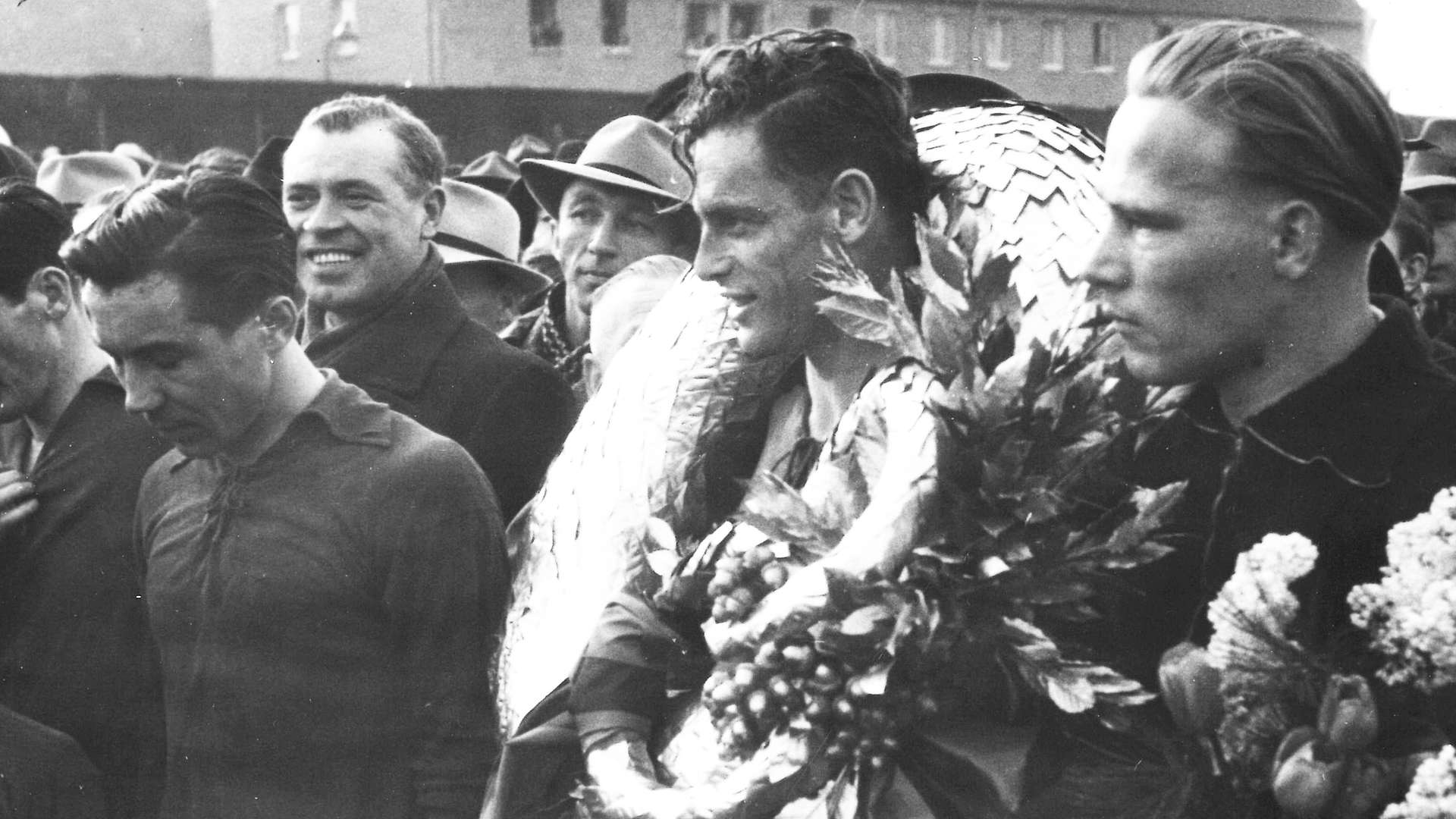
The team celebrated promotion to the top-flight, at that point the biggest success in the club's history, at length in the clubhouse and later in the club bar run by football boss Rudi Krahne.
The Leverkusen success was captured by the newspapers in long articles and on special pages. "Clearly the best team In the the second group of the second western German league […] were crowned champions. This league title did not fall into the hands of the team, their staff and management, on the contrary, it was like all big performances achieved with great effort, work and sacrifice," wrote the Rheinecho.
The Kölnische Rundschau saw Bayer 04 reach a "new milestone in their club history" and in their analysis they went as far as to say with an equally unwieldy as bold hypothesis: "The group championship, already probable for weeks, tantamount to the officially documented promotion to the top division in western Germany has put a club, residing on the outer periphery of the Rhine district, where signs from the competitive Lower Rhine became perceptible, finally in the sporting perception and consideration of Cologne. Bayer 04 thereby, almost overnight, became a Cologne club."– As a Leverkusener that's enough to make you speechless even today. Clearly Bayer 04's promotion back then provided a big shock across the other side of the Rhine…
At the third attempt – after two failed efforts in 1949 – Leverkusen succeeded in making it to the top tier in football in the West where big teams were at home. Opponents in the following Oberliga season included Borussia Dortmund, Rot-Weiß Essen, FC Schalke 04 and Fortuna Düsseldorf. But in terms of being promoted to the top of football it would take another few years.
Facts and stats on the 1950/51 season:
Best defence: The champions conceded the fewest goals (36). There were seven clean sheets.
Top away from home: Bayer 04 had the best away record in the league. The team only lost once on the road (at VfL 99 Köln). In addition to ten wins, Leverkusen picked up four draws.
Longest run: Bayer 04 were undefeated in 14 games in succession from matchday 17 to matchday 30
Attendance: 150,000 spectators watch the 30 games played by Bayer 04 – an average of 5,000 per game.
The top goalscorers: Kirchberg (14 ), Job (12), Wiorek (12), Spikofski (9), Becks (7), Flohr (7)
Related News
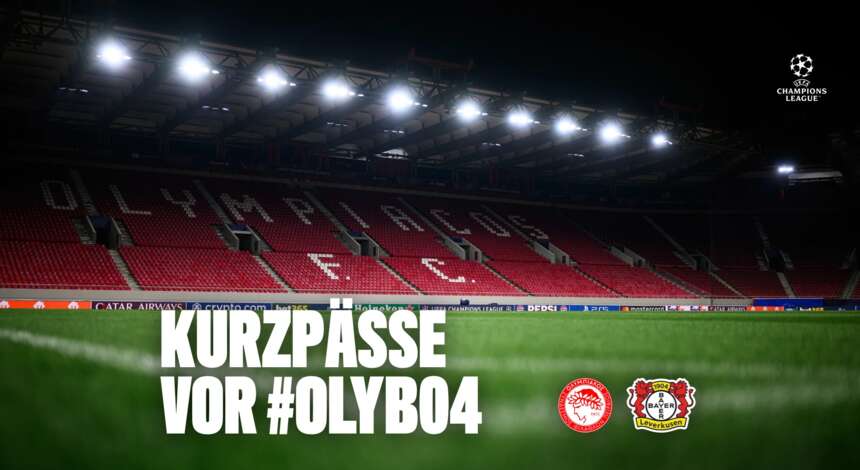
Matchday news #OLYB04: ‘Seize the chance for revenge’
Bayer 04 and Olympiacos had only met twice before the current UEFA Champions campaign. After the encounter on Matchday 7 of this season’s league phase, the Werkself travel to face the Greek side for the second time in just four weeks for the knockout play-off first leg. The Black and Reds were dominant for large spells in mid-January but lost 2-0 after missing a number of presentable chances. The Werkself aim to do better on Wednesday night to “seize the chance for revenge,” as managing director sport Simon Rolfes put it. Here’s all you need to know ahead of the game in our matchday news.
Show more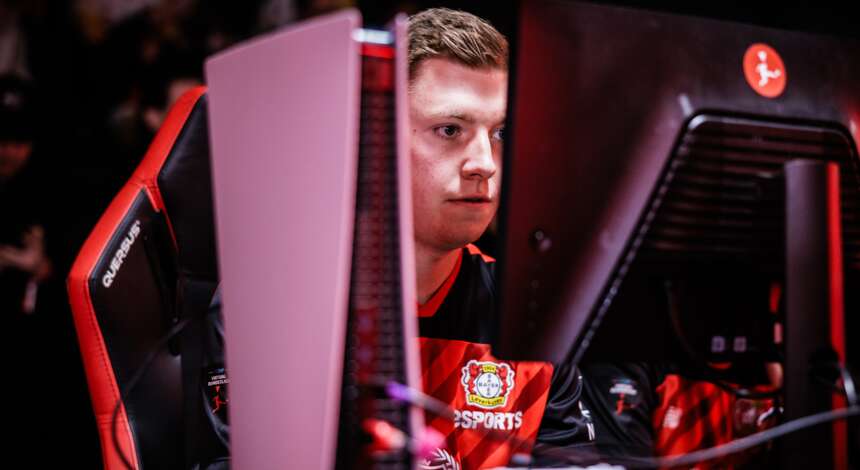
#B04eSports: Bayer 04 miss out on offline round and top eight
A bitter end to the fifth showdown of the 2025/26 VBL Club Championship as the #B04eSports team failed to take any points in the three remaining matches of the preliminary online round of the fifth and final showdown, missing out on the offline round. They can no longer take points in the overall table. Bayer 04 slipped out on the top eight, so direct participation in the final event for the German Club Championship is no longer possible, with Bayer 04 having to contest the play-offs.
Show more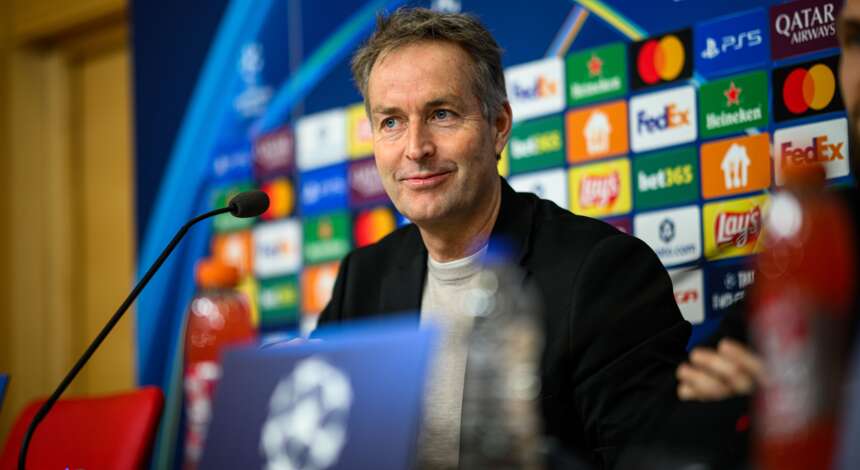
Hjulmand ahead of #OLYB04: ‘Give it our best for fans and club’
A rematch in Athens: On Wednesday, 18 February (kick-off: 21:00 CET), the Werkself face Greek double winners Olympiacos for the second time this season at the Karaiskakis Stadium. After the encounter in the league phase, it's now time for the first leg of the 2025/26 UEFA Champions League play-offs. Ahead of the game, head coach Kasper Hjulmand spoke about how his side will approach the clash, while captain Robert Andrich explained how the team will try to dampen the atmosphere in the stadium tomorrow.
Show more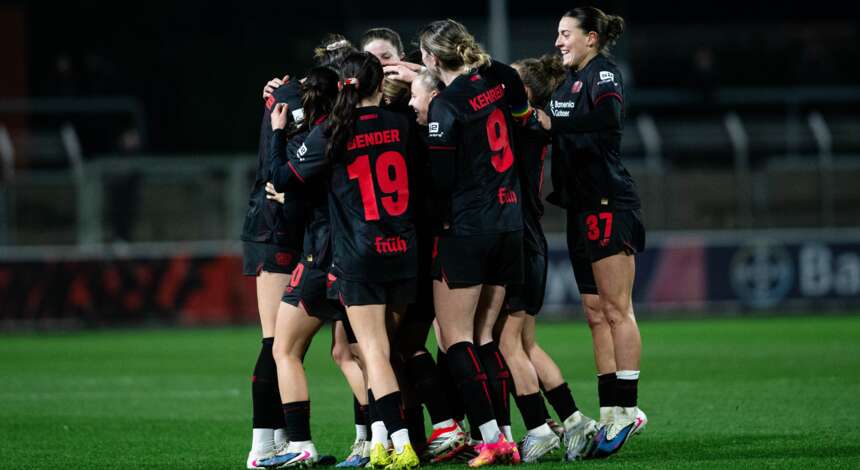
Get your tickets now: Pre-sale for women's home game against Jena started
With the much-celebrated 2-1 derby win against 1. FC Köln, the Bayer 04 Women underlined their credentials as one of the top teams in the Bundesliga. Anyone wishing to support the Werkself in the stadium in the race for third place can now purchase tickets for the home match against FC Carl Zeiss Jena. Tickets are also still available for the upcoming clash against TSG Hoffenheim at the Ulrich Haberland Stadium on Sunday, 22 February. The latest information at a glance.
Show more
#B04eSports: Aiming to secure direct entry to the offline round against Bayern and Co.
Let's give it our all one more time! Today, Tuesday 17 February (live on the VBL Twitch channel from 18:00 CET), the #B04eSports team play the remaining three preliminary round matches of the fifth and final showdown of the VBL Club Championship 2025/26. The Leverkusen console pros go up against 1. FC Nürnberg, 1. FC Magdeburg and Bayern Munich, aiming to secure their place in the offline knockout round and pick up valuable points for the overall table and the battle to get into the final event for the German Club Championship. The lowdown on our next opponents.
Show more